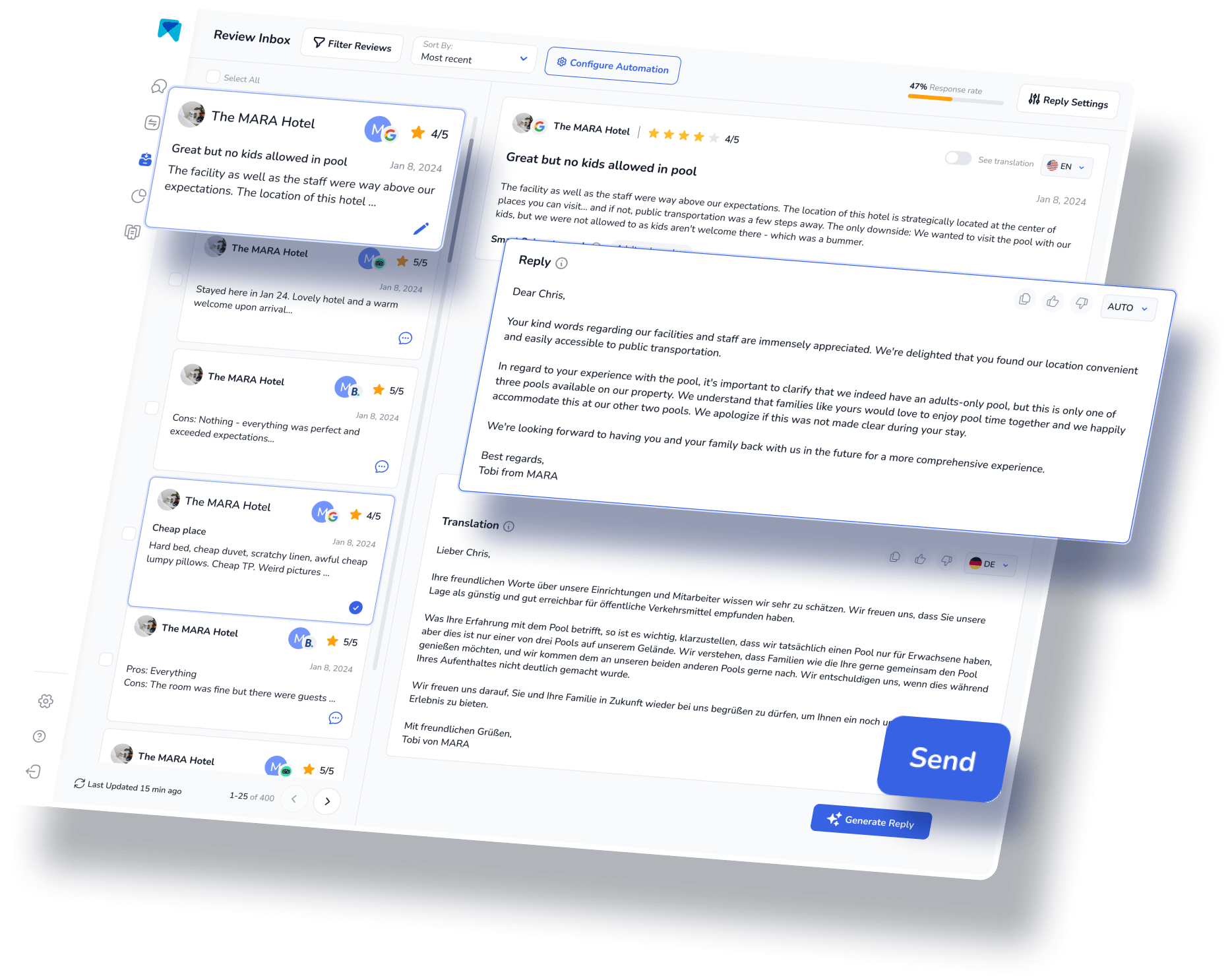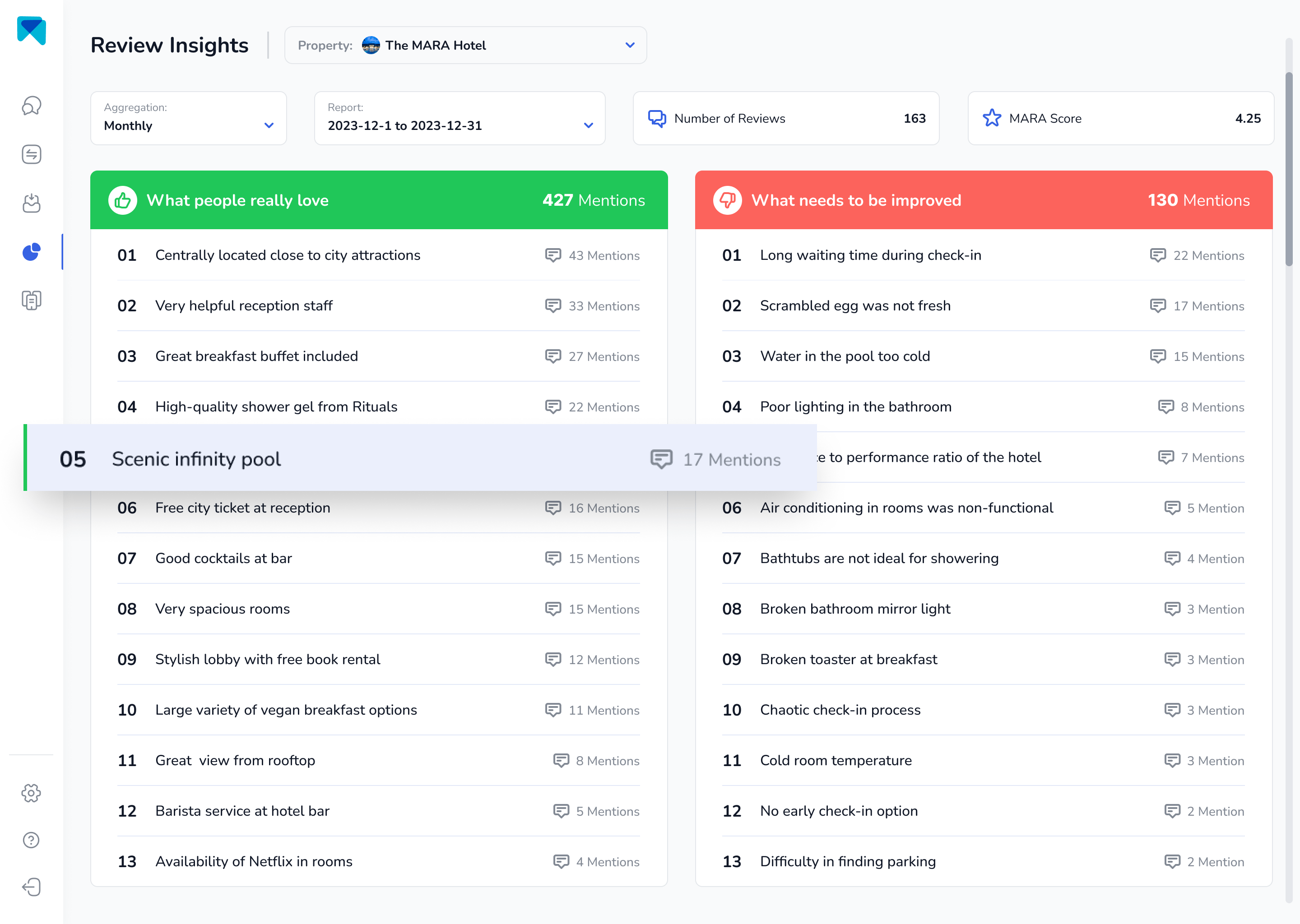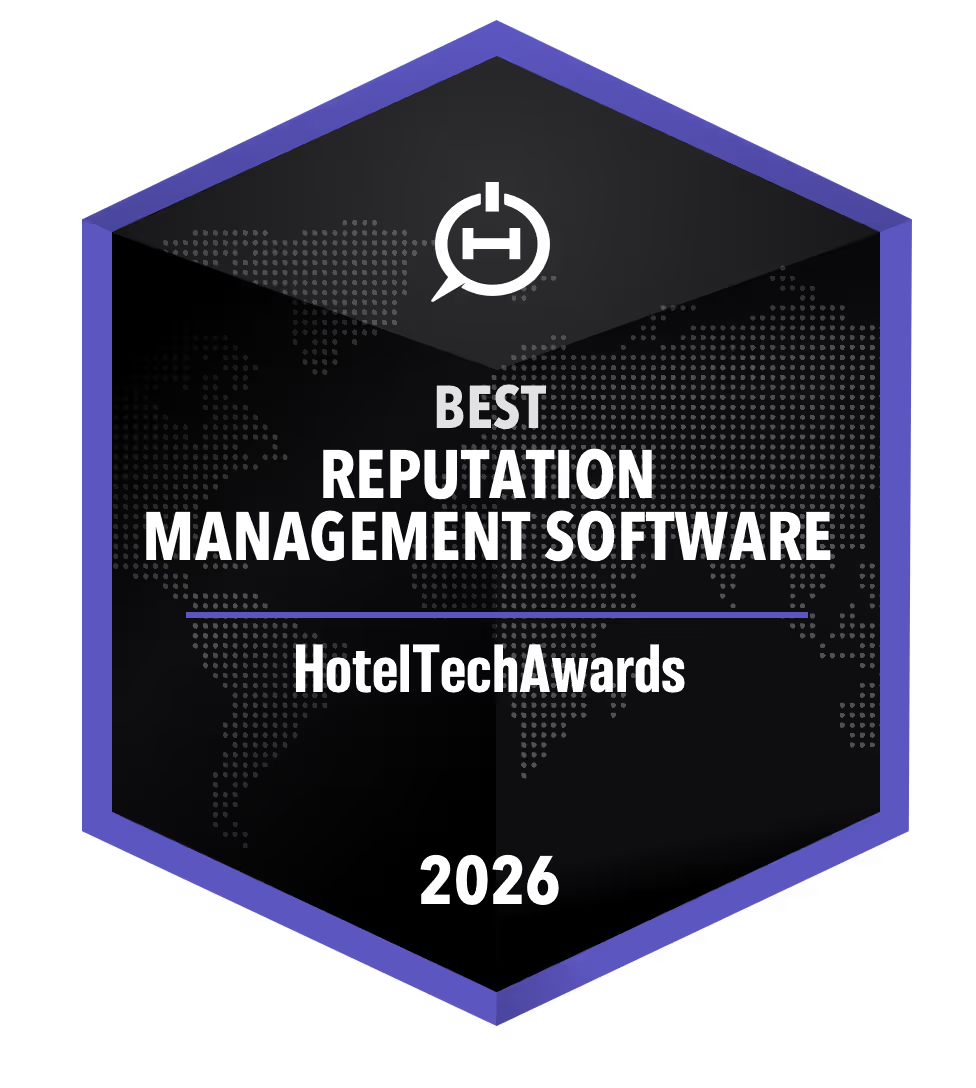Las redes sociales se han convertido en parte integral del marketing moderno, especialmente en el sector hotelero. Para los hoteles, una presencia efectiva en redes sociales puede mejorar significativamente su visibilidad, conectar con huéspedes actuales y potenciales e impulsar las reservas. Este artículo explora el impacto de las redes sociales en los hoteles y presenta siete estrategias efectivas para aprovechar su potencial.
¿Cuál es el impacto del marketing en redes sociales en los hoteles?
El marketing en redes sociales es un componente vital en la industria hotelera, ya que impacta significativamente la visibilidad y la reputación de marca de los hoteles. Al aprovechar diversas estrategias en redes sociales, los hoteles pueden conectar directamente con una audiencia diversa, crear contenido visualmente atractivo y fomentar interacciones en tiempo real con los huéspedes. Métricas clave como las tasas de interacción, el tráfico de referencia y las tasas de conversión son indicadores cruciales del éxito para los profesionales del marketing en el sector hotelero.
Un excelente ejemplo del impacto del marketing en redes sociales en los hoteles es el rediseño del Hotel Mondrian 2019. Durante este proyecto, las redes sociales fueron fundamentales en las fases de planificación y ejecución. Aidan Marus, Director de Vida Nocturna del hotel, enfatizó el papel de la estrategia en redes sociales desde el principio. "Las conversaciones iniciales se centraron en cómo el nuevo mobiliario, los accesorios y los diseños influirían en la interacción en redes sociales. Anticipamos que el mural de helados de Michael se convertiría en una atracción visual clave al entrar los huéspedes al Skybar por la entrada Sunset", señaló Marus. Este caso ilustra cómo los hoteleros pueden aprovechar las herramientas de marketing en redes sociales para definir decisiones de diseño y operativas, mejorando tanto el atractivo del hotel como la experiencia general del huésped.
Al incorporar las redes sociales a su estrategia de marketing, los hoteles pueden utilizar eficazmente las herramientas de marketing para amplificar la presencia de su marca, conectar con huéspedes potenciales e impulsar las reservas. Este uso estratégico del marketing en redes sociales demuestra su profundo impacto en el éxito y la reputación de los hoteles en el competitivo sector hotelero.
¿Cómo puede el marketing en redes sociales influir en las decisiones de los consumidores a la hora de seleccionar un hotel?
Las redes sociales desempeñan un papel fundamental en la percepción del consumidor e influyen en sus decisiones de selección de hoteles, especialmente en la era de los millennials y la generación Z. Dado que el 55 % de los consumidores le da "me gusta" a la página de Facebook de un hotel para obtener más información sobre la propiedad, las redes sociales son esenciales para descubrir la marca y mejorar su visibilidad.
El contenido generado por los usuarios tiene un impacto significativo en los huéspedes potenciales, ya que el 76 % de las personas comparte fotos de sus vacaciones en diversas redes sociales. Esta tendencia subraya la importancia de ser "instagrameable" y utilizar hashtags populares y etiquetas de ubicación para aumentar la visibilidad de un hotel. Las reseñas positivas y el contenido atractivo en plataformas como TripAdvisor y Google Reviews generan credibilidad y confianza, factores cruciales para los viajeros. Además, el uso eficaz de los anuncios de Facebook y las plataformas de marketing puede impulsar el boca a boca, impulsando el conocimiento y las reservas gracias a una mayor presencia en redes sociales.
¿Quieres saber más sobre las plataformas de reseñas y anuncios online que influyen en la presencia online de las marcas hoteleras? Lee nuestro artículo " Optimiza tus anuncios de hotel para aumentar las reservas: todo lo que necesitas saber".
¿Cuáles son las 7 estrategias efectivas de marketing en redes sociales para hoteles?
Implementar estrategias efectivas de marketing en redes sociales es crucial para que los hoteles mejoren su presencia en línea y conecten con huéspedes potenciales. Aquí hay siete estrategias clave que los hoteleros deberían considerar:
a. Optimizar los perfiles y el contenido de las redes sociales para la búsqueda
Las estadísticas revelan que los hoteles con galerías de fotos bien cuidadas obtienen un 138 % más de interacción con los usuarios y tienen un 225 % más de probabilidades de conseguir reservas, en comparación con aquellos menos activos en redes sociales. El SEO se extiende a las plataformas de redes sociales, donde los hoteles deben utilizar palabras clave relevantes, imágenes de alta calidad y una imagen de marca coherente. Elaborar descripciones bien redactadas y usar hashtags estratégicos puede aumentar significativamente la visibilidad. Por ejemplo, incorporar etiquetas de ubicación y hashtags específicos de la zona puede atraer a los viajeros que buscan alojamiento en esa región.
Obtenga más información sobre cómo Google clasifica los resultados de búsqueda en este artículo .

b. Aprovechar el contenido generado por los usuarios y las reseñas en línea
Una encuesta de Expedia reveló que el 30% de los estadounidenses se dejan influenciar por las redes sociales al reservar un viaje. Compartir contenido generado por el usuario (CGU) y reseñas positivas en línea puede mejorar la credibilidad de la marca hotelera. Animar a los huéspedes a compartir sus experiencias y reutilizar este contenido para campañas de marketing puede generar una imagen de confianza. Los hoteles también pueden lanzar campañas que incentiven a los huéspedes a publicar reseñas o compartir fotos, que pueden aparecer en la página de Facebook, Instagram y otras redes sociales del hotel.

Aprenda a medir el ROI de las reseñas en línea en nuestro artículo: Comprender el ROI de las calificaciones de reseñas en línea: métricas, KPI y más
{{blog-cta-video="/features/product-updates"}}
c. Utilizar publicidad pagada en redes sociales para campañas específicas
La publicidad pagada en redes sociales, como Facebook e Instagram, permite a los hoteles segmentar a grupos demográficos, intereses y comportamientos específicos. Con una tasa de conversión promedio de aproximadamente el 9% en anuncios de Facebook y un CPC promedio de entre $0.26 y $0.97, los hoteles pueden crear anuncios que destaquen ofertas especiales, promociones de temporada o servicios exclusivos. Monitorear el rendimiento de los anuncios y ajustar la segmentación y el contenido para optimizar el ROI es crucial. Un presupuesto eficaz y una comprensión clara de las métricas publicitarias son clave para campañas publicitarias exitosas que impulsen las reservas.
Google Hotel Ads es una de las plataformas de publicidad digital más rentables para el sector hotelero. Descubre cómo aprovechar al máximo los anuncios de pago en las plataformas de Google en nuestro artículo " Google Hotel Ads: La guía definitiva del hotelero experto".

d. Interactuar con personas influyentes y embajadores de marca
El marketing de influencers puede ampliar el alcance y la autenticidad de un hotel, con tasas de conversión que oscilan entre el 1% y el 5% . Colaborar con influencers de viajes y embajadores de marca que se alineen con el público objetivo del hotel puede ser muy eficaz. Negociar las condiciones, definir objetivos claros para la campaña y medir el impacto son pasos esenciales. Por ejemplo, invitar a un influencer a alojarse en el hotel y compartir su experiencia puede generar contenido de vídeo auténtico y aumentar la visibilidad entre sus seguidores.

Leyenda: Ejemplo de una campaña de marketing de influencers para el sector hotelero. Fuente: Find Your Influencer
e. Implementar campañas de marketing estacionales y basadas en eventos
Alinear el contenido de redes sociales con las tendencias de temporada y los eventos locales puede impulsar la interacción y las reservas hasta en un 84% . Los hoteles pueden crear publicaciones en redes sociales sobre festividades, festivales o atracciones locales. Por ejemplo, promocionar un paquete vacacional de invierno durante las fiestas o destacar eventos especiales como un festival gastronómico local puede atraer a huéspedes potenciales y fomentar las reservas. Estas campañas de marketing aprovechan hashtags populares y etiquetas de ubicación para maximizar el alcance.

f. Crear contenido interactivo y atractivo
El contenido interactivo, como encuestas, cuestionarios y sesiones de video en vivo, puede aumentar significativamente la interacción del usuario hasta en un 70% . Los hoteles pueden usar estas herramientas para recopilar comentarios, entretener e informar a su público. Algunos ejemplos incluyen recorridos virtuales del establecimiento, sesiones de preguntas y respuestas con el personal o encuestas interactivas sobre las preferencias de los huéspedes. Este enfoque crea una presencia dinámica en redes sociales que conecta con los huéspedes potenciales y fomenta la interacción.

Leyenda: Una marca hotelera invita a sus seguidores de Facebook a unirse a un juego de trivia: una forma perfecta de educar a los millennials sobre la historia de su marca.
g. Monitorear y analizar el rendimiento de las redes sociales
Usar herramientas de análisis para monitorizar el rendimiento de las redes sociales es esencial para la mejora continua. Métricas como las tasas de interacción, el alcance y las tasas de conversión ofrecen información sobre qué funciona y qué no. Revisar estas métricas periódicamente y ajustar las estrategias en función de los datos de rendimiento puede resultar en campañas más efectivas. Herramientas como Facebook Insights, Instagram Analytics y plataformas de terceros como Hootsuite ofrecen datos valiosos para perfeccionar las estrategias de redes sociales y lograr mejores resultados.

Al integrar estas estrategias, los hoteles pueden mejorar sus esfuerzos de marketing en las redes sociales, conectarse de manera más efectiva con su público objetivo e impulsar el éxito en la competitiva industria hotelera.
¿Cuál es la mejor estrategia de marketing en redes sociales para hoteles de lujo?
Los hoteles de lujo deben implementar una estrategia sofisticada en redes sociales que refleje su marca de alta gama y atraiga a viajeros adinerados. Crear contenido visualmente impactante que muestre las lujosas comodidades del hotel, las exquisitas experiencias gastronómicas y las impresionantes vistas es crucial. El uso de contenido de video de alta calidad y recorridos virtuales en plataformas como Instagram y Pinterest puede cautivar y atraer eficazmente a un público exigente.

Las ofertas exclusivas y las experiencias personalizadas, destacadas mediante una gestión estratégica en redes sociales, elevan aún más el prestigio del hotel. Las colaboraciones con influencers de lujo que comparten publicaciones auténticas sobre sus experiencias de alta gama pueden impulsar significativamente la visibilidad del hotel entre sus seguidores adinerados.
Por ejemplo, 7Pines Resort Ibiza utiliza Instagram con eficacia para mostrar sus lujosas instalaciones y vistas impresionantes, atrayendo a una clientela de alto nivel. También aprovechan Facebook y LinkedIn para promocionar eventos exclusivos, manteniendo una sólida presencia en redes sociales. Este enfoque multiplataforma garantiza que la marca conecte con huéspedes potenciales a través de diversos canales, lo que mejora su estrategia de marketing.
¿Cuál es la mejor estrategia de redes sociales para hoteles independientes?
Los hoteles independientes deberían adoptar una estrategia rentable en redes sociales que destaque sus características únicas y fomente la interacción local. Destacar la decoración distintiva, el servicio personalizado o la importancia histórica del hotel puede diferenciarlo de las grandes cadenas. Las herramientas de gestión de redes sociales pueden ayudar a optimizar estas iniciativas y la interacción.
Aprovechar las colaboraciones locales y promocionar las atracciones cercanas mediante publicaciones en redes sociales puede generar oportunidades de promoción mutuamente beneficiosas. Interactuar con la comunidad local compartiendo publicaciones sobre eventos locales, la historia del hotel y las atracciones cercanas ayuda a crear una narrativa atractiva que conecte con los huéspedes que buscan experiencias auténticas.
Organizar concursos y sorteos en plataformas como Twitter y Pinterest puede impulsar la interacción y ampliar el alcance del hotel. Por ejemplo, organizar un concurso en redes sociales donde los huéspedes tuiteen sus lugares o experiencias locales favoritas genera contenido generado por el usuario y mejora la visibilidad. Este enfoque personalizado y centrado en la comunidad ayuda a los hoteles independientes a fidelizar a sus clientes y a destacar en un mercado competitivo.
Impulsa tu estrategia de redes sociales mediante la gestión de reputación online impulsada por IA – MARA
Gestionar las reseñas online es fundamental para una estrategia exitosa en redes sociales. MARA, nuestro Asistente de Reseñas con IA , integra a la perfección la gestión de la reputación online con las estrategias en redes sociales. Esta intuitiva herramienta está diseñada para simplificar el proceso de Gestión de la Reputación Online, haciéndolo más eficiente, personalizado y rápido. Ofrece la mejor y más personalizada IA para responder y analizar las reseñas de tus huéspedes.
Review Inbox impulsada por IA
Una de las funciones clave de esta herramienta es la Review Inbox . Responder a las reseñas es tan sencillo como hacer clic en "Generar respuesta" y "Enviar". La Review Inbox se conecta a múltiples fuentes de reseñas, como Google, Booking.com y Tripadvisor, lo que te ofrece una vista panorámica de todas tus reseñas. Incluso puedes configurar la automatización de respuestas: ¿Por qué no dejar que MARA responda automáticamente a reseñas sencillas, como las de 5 estrellas de Google, sin texto, para que nunca te pierdas ninguna? Las notificaciones diarias sobre nuevas reseñas te mantienen al día y en control.

Review Analytics
Para ayudarte a comprender y analizar la gran cantidad de reseñas, el Asistente de Reseñas también incorpora Review Analytics . Esto proporciona información práctica y fácil de entender, adaptada exclusivamente a tu negocio. Con MARA, puedes comprender rápidamente todas tus reseñas sin necesidad de leerlas todas. El análisis es tan detallado que puedes descubrir problemas específicos como "el agua de la piscina está demasiado fría" o "falta una opción vegana para el desayuno". Esta información te ayuda a optimizar la experiencia de tus huéspedes sin necesidad de ser un experto en datos.

La respuesta más personal de la IA
La IA de MARA no solo se centra en la eficiencia, sino también en la personalización. La Brand Voice permite que la IA se adapte a tu tono, asegurándose de que tus respuestas suenen auténticas. Además, con Smart Snippets , puedes enseñarle a la IA cómo responder a elogios o quejas recurrentes. Tu IA incorpora esta información a sus respuestas, pero siempre con palabras diferentes, proporcionando respuestas más personalizadas y relevantes.
Este asistente de respuesta a reseñas se ha convertido rápidamente en una herramienta revolucionaria para más de 2000 clientes. Su prometedora capacidad para mejorar la calificación general, aumentar las tasas de respuesta, extraer información de los comentarios de los clientes y ahorrar tiempo y dinero es la razón de su creciente popularidad.
Gestionar reseñas en línea no tiene por qué ser una tarea abrumadora. Con el software adecuado, no solo puede agilizar el proceso, sino también personalizar sus respuestas y obtener información valiosa de las reseñas. Así que, ¿por qué no probar MARA, nuestro Asistente de Reseñas con IA? Es completamente gratuito , no requiere tarjeta de crédito y está completamente operativo en menos de cinco minutos.
Pensamiento final
Una estrategia integral de marketing en redes sociales es crucial para impulsar el éxito en el sector hotelero. Los hoteleros deben aprovechar diversas plataformas de redes sociales para construir y fortalecer su marca. Al optimizar sus perfiles en redes sociales, utilizar el marketing de influencers e interactuar con ellos para llegar a su público objetivo, los hoteles pueden impulsar significativamente su presencia online. El uso eficaz de la publicidad de pago en plataformas como Facebook y LinkedIn amplía aún más el alcance y la interacción. Los profesionales del marketing en el sector hotelero deben perfeccionar continuamente su enfoque en función de las tendencias del sector y las métricas de rendimiento para garantizar un éxito sostenido.
{{blog-cta="/features/product-updates"}}
Preguntas frecuentes:
El marketing en redes sociales en la industria hotelera implica aprovechar plataformas como Facebook, Instagram y LinkedIn para promocionar hoteles, interactuar con los huéspedes e impulsar las reservas a través de una variedad de actividades en línea.
Las redes sociales desempeñan un papel multifacético en el marketing hotelero al aumentar el conocimiento de la marca, interactuar con los clientes, fomentar la lealtad y mostrar las comodidades y experiencias del hotel.
Una fuerte presencia en las redes sociales mejora la visibilidad de un hotel, permite la interacción directa con huéspedes potenciales y actuales y respalda la gestión de la reputación a través de comentarios y reseñas en tiempo real.
Los beneficios incluyen una mejor percepción de la marca, más reservas, mejores conocimientos sobre los clientes y la capacidad de ejecutar campañas de marketing específicas que lleguen a grupos demográficos e intereses específicos.
La frecuencia de publicación debe equilibrar la consistencia con la calidad. Las mejores prácticas del sector sugieren publicar al menos un par de veces por semana, con una frecuencia adaptada a la plataforma de redes sociales y los patrones de interacción de la audiencia.




















-min.avif)
